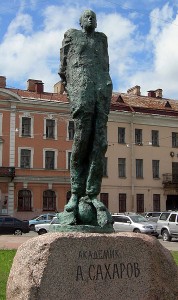
Soviet dissident Andrei Sakharov was released from exile in the town of Gorky on December 19, 1986 by head of the USSR, Mikhail Gorbachev. He was one of the lead researchers in the Soviet development of nuclear weapons, a program known as the Third Idea. Sakharov was to be one of the leading advocates of improving Soviet human rights in the 60’s through the 1980’s.
Andrei Dmitrievich Sakharov was born on May 21, 1921 in Moscow to an educated couple, Dmitri Ivanovich Sakharov and Yekaterina Alekseyevna. His father was a physics teacher in a private school and later at the Second Moscow State University. Early on one could see that Sakharov was a brilliant student. In 1938, he entered Moscow State University to begin his studies later going to the Lebedev Physical Institute. There he honed his skills in physics where he received his PhD in 1947.
With the Cold War, Stalin pressured his scientists to catch up to the Americans with nuclear bombs of their own. Sakharov moved to the closed city of Sarov near Nizhny Novgorod (then the town of Gorky) to become an important part of the Soviet nuclear program. There he was part of the Third Idea, basically the building of thermonuclear weapons. In the coming years, he would feel little guilt about his part in creating the bombs as he thought that the threat reduced the risk of a third world war.
By the 1960’s, Sakharov began to see that the Soviet and American leaders were moving the world towards confrontation. He was worried about his role in any potential thermonuclear war. He pushed hard for the 1963 Partial Test Ban Treaty, signed in Moscow. It was the concept of anti-ballistic defense that created the true moral dillema that was to face Sakharov. In a letter to the Soviet leadership he wrote that they “take the Americans at their word for a bilateral rejection by the USA and the Soviet Union of the development of antiballistic missile defense.”
He wrote an essay in May of 1968 entitled, “Reflections on Progress, Peaceful Coexistence, and Intellectual Freedom.” It gained international notoriety but the Soviet leadership was not pleased. He was banned from all military work and was by now closely watched by the KGB.
By the early 1970’s both he and author Aleksandr Solzhenitsyn were targeted as dissidents and considered traitors. Constantly harassed he and his new wife, fellow dissident Yelana Bonner refused to back down. He won the Noble Peace Prize in 1975 but was banned by the government to leave the country and accept the award. On January 22, 1980 he was sent into internal exile in Gorky (now back to Nizhny Novgorod) for publicly protesting the war in Afghanistan.
He and his wife went on a number of hunger strikes to protest their treatment and to demand that Yelana be allowed to go to the United States for heart surgery. It was not until December 19, 1986 that Mikhail Gorbachev allowed him to return from exile. Three short years later, on December 14, 1989, Sakharov died of a heart attack at the age of 68. Around the world, there are now a number of awards named in his honor for people who fight for human rights. There is a physics award given by the American Physical Society “to recognize outstanding leadership and/or achievements of scientists in upholding human rights”.